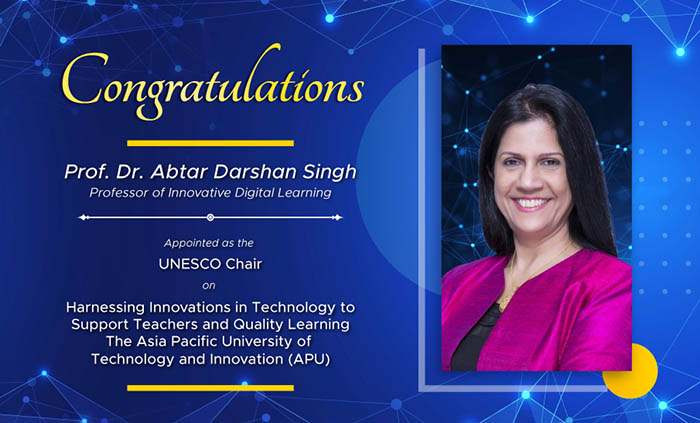UNESCO have appointed Malaysian based Professor Dr. Abtar Darshan Singh becomes the first academic from a Malaysian private university to be appointed to the Unesco Chair on Harnessing Technological Innovations to Support Teachers and Quality Learning.
She is currently the Professor of Innovative Digital Learning at Asia Pacific University of Technology and Innovation (APU). Dr. Abtar, who also serves as the director of APU’s Digital Learning Hub, will serve her position as the Unesco Chair for a duration of four years.
This is Dr Abtar’s second encounter with Unesco as she previously took home the top honour in the 2015 Unesco Institute International Competition in Education, which was held in St. Petersburg, Russia.

Dr. Abtar earned a Master of Science in Instructional Design, Development and Evaluation from Syracuse University in the United States. She also holds a PhD in web-based learning from Universiti Malaya.
The former Fulbright scholar who completed her postdoctoral work at Indiana University in the US, has been actively involved in teaching and developing technological advancements in higher educations both in Malaysia and overseas.
As the UNESCO Chair, Dr Abtar will spearhead research, training, and knowledge-sharing projects on utilising technological advancements to support educators and learning in Malaysia and other developing economies around the world.
This also entails providing educators with resources and tools to improve hybrid learning, which is becoming more and more crucial in the post-pandemic learning environment.
Prof. Dr. Abtar said, “ I’m humbled by the appointment and wish to thank UNESCO for their trust and confidence in me and APU.”
“Together with our partner organisations, we will work very hard to promote innovations in technologies including AI to help enhance the quality of teaching and learning among teachers, educators and curriculum developers in Malaysia and the region.” she stated on her appointment.
The UNITWIN/UNESCO Chairs Programme, which was established in 1992, involves more than 850 institutions across 117 nations. Its goal is to advance an integrated system of research, training, and activities in a variety of fields by establishing university networks and fostering inter-university cooperation.
One of the main goals of the UNESCO Chair is to promote inclusive education for everyone, including girls and children by utilising technological advancements and fostering cooperation among education stakeholders.
Malaysia also holds two other UNESCO Chairs. They are the Unesco Chair on Social Practices in Intercultural Communication and Social Cohesion (Universiti Kebangsaan Malaysia) and the Unesco Chair on Ecohydraulics for Sustainable Water Infrastructures for SDG 6 in the Asia and the Pacific Region (Universiti Sains Malaysia).











